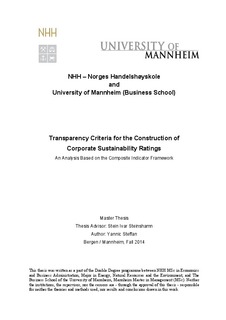Transparency Criteria for the Construction of Corporate Sustainability Ratings : An Analysis Based on the Composite Indicator Framework
Abstract
Corporate sustainability ratings or sustainability ratings (SRs) are applied to integrate sustainability
in investment decisions. In order to evaluate the contribution to tackling sustainability
challenges and in order to apply them, agencies need to disclose information about the
construction of the SR. This thesis follows four steps to present transparency criteria for the
construction of SRs. First, I show that the composite indicator framework is applicable to
SRs. Second, I use this framework to find out how a one-dimensional measure, which represents
a multi-dimensional phenomenon like corporate sustainability, is constructed. This
identifies the choices that agencies have when constructing an SR. Third, I use these findings
to derive 14 elements that need to be described in order to enable the interpretation of an SR.
These elements constitute the transparency criteria. Fourth, the application of the transparency
criteria is demonstrated by an empirical review of information that is published during the
accreditation by the quality standard Arista 3.0. The last part finds that the accredited agencies
do not publish sufficient information to enable the SRs’ interpretation and that the Arista
3.0 does not achieve the targeted transparency. I conclude that the transparency criteria are
useful to analyze whether disclosed information is sufficient to enable the interpretation of
SRs.
